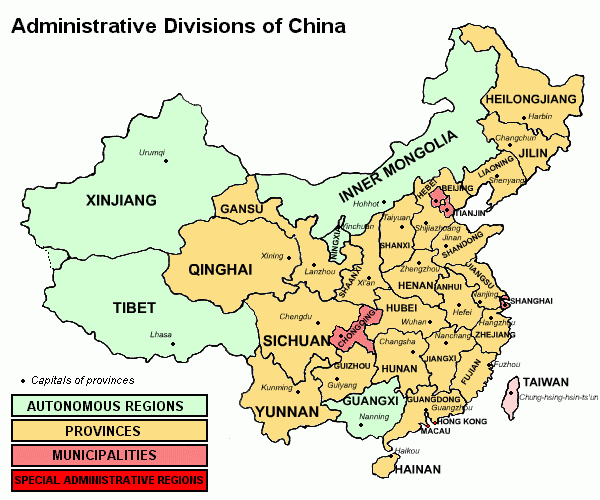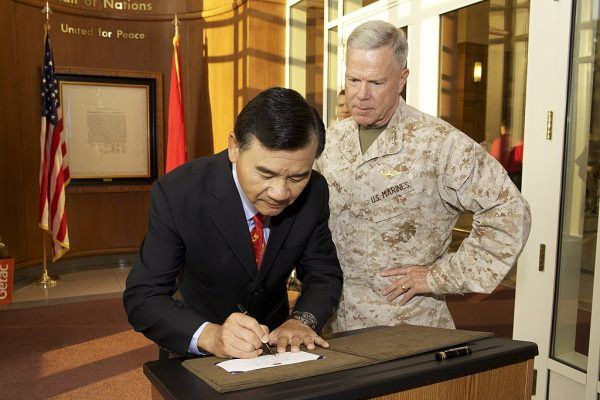Perusing international headlines, it would seem that the world is on the verge of coming to an end as a result of President Donald Trump signing the Taiwan Travel Act into law on March 16.
Before the ink dried on Trump’s desk, China responded with outrage to the act, even going so far as to implicitly threaten military action in response. China’s foreign ministry spokesman Lu Kang said the day after the act was signed, “We urge the US side to correct its mistake and stop pursuing any official ties with Taiwan or improving its current relations with Taiwan in any substantive way.” The Chinese embassy in Washington followed by issuing its own statement saying that certain clauses of the legislation “severely violate…the political foundation of the China-US relationship.”
What’s all the fuss really about?
First, it’s important to understand exactly what this new law actually is. The Taiwan Travel Act doesn’t precisely contain any legal requirements; they’re more like strong suggestions. The text of the legislation opens by explaining the bill’s purpose is to “encourage” visits between United States and Taiwan officials “at all levels” of government. Section II of the act states, “Visits to a country by United States Cabinet members and other high-ranking officials are an indicator of the breadth and depth of ties between the United States and such country” and that “relations between the United States and Taiwan have suffered from insufficient high-level communication due to the self-imposed restrictions that the United States maintains on high-level visits with Taiwan.”
As a solution to remedy these “suffering relations,” the bill provides the “Sense of Congress” on the issue, a legislative term used to formally express opinions about subjects of national interest or security. According the act, Congress feels that it should be the policy of the United States to “allow officials at all levels of the United States Government,” including “Cabinet-level” officials, “national security” personnel, and other “executive branch officials,” to make formal visits to Taiwan in order to meet their Taiwanese counterparts. The act also allows “high-level officials of Taiwan to freely enter the United States” and requires that “appropriate respect for the dignity of such officials” be demonstrated upon their arrival.
As the above quotes from the act indicate, it is clear that the new law only makes explicit the general approach of the US government toward Taiwan over the past 35 years. These decades have been important in the development of US policy in the Western Pacific and have seen several incremental steps in the fomenting of America’s delicate relationship with authorities in Taipei, a position that is in spite of mainland China’s position that Taiwan is nothing more than a wayward “Chinese colony.”

The dual position the US has taken on Taiwan goes back to the era immediately following the Second World War. The Communist revolution had succeeded in wresting control of the entire mainland, resulting in the “One China” policy adopted by the United States. While this policy may have sounded very reassuring to the new communist overlords of China, in truth this policy was highly ambiguous in regards to the status of Taiwan. The policy only asserted that the People’s Republic of China, or PRC, was the only legitimate governing body of China, but did not relate to any specific territorial claims in regards to Taiwan or any other location. This left open the possibility for the US to on the one hand grant PRC its recognition as the primary ruling entity of China, while at the same time actively pursue relations with Taiwan.
American administrations since the early 1950s have had strong ties with Taiwan. Truman sent substantial aid to the island during the Korean War. Eisenhower actually visited the country during his term. Kennedy received officials from Taipei in the White House. But it was Ronald Reagan who was the first to really codify the US stance on Taiwan in 1982. In his famous “Six Assurances,” Reagan made clear that at least some recognition of Taiwan would be an important part of US foreign policy.
In brief, these assurances established two main points: (a) the US would not push any policy regarding Taiwanese sovereignty, and (b) the US would continue to provide weapons and military aid to Taiwan indefinitely. Until that time, three US presidents (Nixon, Carter, and oddly enough, Reagan himself) in statements that came to be known as the “Three Communiques” had taken positions that seemed to support PRC’s stance on Taiwan. The “Six Assurances” were a bit of an about-face, at least from an official perspective. The interaction between Taiwan and the US today is a direct continuity from Reagan’s declaration. The US doesn’t touch the issue of sovereignty, not with a ten-foot pole, and America continues to be the primary foreign supplier of arms to the Taiwanese army.
Of course, maintaining happy relations with Taipei has triggered flashpoints with China over the years. One relevant example occurred in 2002, when Minister of Justice Chen Ding-nan became the first Taiwan official to visit the United States. The substantially low-key nature of the visit was reportedly due to objections of Chinese officials. It is against this backdrop of China’s extreme sensitivity on the issue that the US has to maintain its relations with Taiwan. Any change or aberration in the way America conducts itself in relation to the country is seen by Beijing as a move toward official Taiwanese independence.

To be fair to China’s concerns, encouraging visits between US and Taiwan officials is, as the act itself states, an indication of the “breadth and depth of ties” between countries. The Travel Act was especially troubling to Beijing considering the growing influence of voices in Congress over the past several years promoting full recognition of Taiwan. Over the past decade, leading US policymakers, such as Representatives Steve Chabot (R-OH), Brad Sherman (D-CA), and the chairman of the House Foreign Affairs Committee, Ed Royce (R-CA), along with Senators Marco Rubio (R-FL) and Sherrod Brown (D-OH), have increasingly argued that current guidelines for US-Taiwan relations are outdated, and the United States should move toward normalizing ties with Taiwan. China’s concern was only bolstered by the fact that the recent bill passed both the House and the Senate unanimously.
Ultimately, the implications of this bill are still up in the air. As many observers have pointed out, since the act only encourages increased ties without actually defining what steps to take, the law will only be as important as Trump makes it. It is anyone’s guess how the administration will go about putting this bill into practice. Trump could announce an official visit to Taiwan tomorrow or could continue business as usual.
Of course, a key consideration for the administration on how to act on the bill is the current tension between the US and China and a range of issues, from the economic to the security-related. Washington does risk pushing relations with China past the point of no return. As one top-ranking former PRC military official told media sources, the passing of the act is seen by China as “crossing the red line” and will “thoroughly undermine relations,” not exactly a place the US wants to be in, considering both the current contention between the two countries on important topics and the support America would like to see from China on several ongoing issues, not the least of which is the prospect of reconciliation with North Korea.

Furthermore, the hinting by Chinese officials to an armed response to the bill should not be taken as an empty threat. China has a long history of openly harassing Taiwan militarily. As recently as December, China launched a large aerial “patrol” of bombers and fighter jets over the waterways to its east, including the Bashi Channel between Taiwan and the Philippines. The signing of the act along with other recent American “provocations” such as Trump’s signaled intent to send US warships on visits to Taiwan could collectively be used by China as an excuse to revert back to these actions.
The signing of the Taiwan Travel Act puts the US stands at a junction. This could spur a huge escalation in the tensions between the PRC and the United States, resulting in anything ranging from tit-for-tat diplomatic actions to military confrontation. Alternatively, the administration could take no action, and the bill and the whole thing could blow over by next week. With any luck, cooler heads will prevail in the outcome to this most recent clash in US-Chinese relations.
















